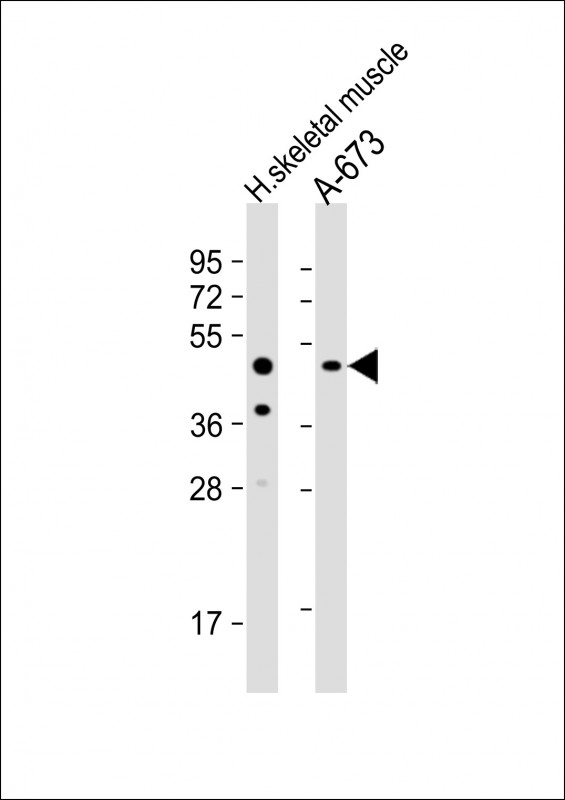KIST (KIS) Antibody (C-term)
Purified Rabbit Polyclonal Antibody (Pab)
- SPECIFICATION
- CITATIONS
- PROTOCOLS
- BACKGROUND

Application
| WB, E |
|---|---|
| Primary Accession | Q8TAS1 |
| Other Accession | Q63285, NP_787062 |
| Reactivity | Human, Mouse |
| Predicted | Rat |
| Host | Rabbit |
| Clonality | Polyclonal |
| Isotype | Rabbit IgG |
| Calculated MW | 46546 Da |
| Antigen Region | 265-295 aa |
| Gene ID | 127933 |
|---|---|
| Other Names | Serine/threonine-protein kinase Kist, Kinase interacting with stathmin, PAM COOH-terminal interactor protein 2, P-CIP2, U2AF homology motif kinase 1, UHMK1, KIS, KIST |
| Target/Specificity | This KIST (KIS) antibody is generated from rabbits immunized with a KLH conjugated synthetic peptide between 265-295 amino acids from the C-terminal region of human KIST (KIS). |
| Dilution | WB~~1:1000 E~~Use at an assay dependent concentration. |
| Format | Purified polyclonal antibody supplied in PBS with 0.09% (W/V) sodium azide. This antibody is prepared by Saturated Ammonium Sulfate (SAS) precipitation followed by dialysis against PBS. |
| Storage | Maintain refrigerated at 2-8°C for up to 2 weeks. For long term storage store at -20°C in small aliquots to prevent freeze-thaw cycles. |
| Precautions | KIST (KIS) Antibody (C-term) is for research use only and not for use in diagnostic or therapeutic procedures. |
| Name | UHMK1 |
|---|---|
| Synonyms | KIS, KIST |
| Function | Upon serum stimulation, phosphorylates CDKN1B/p27Kip1, thus controlling CDKN1B subcellular location and cell cycle progression in G1 phase. May be involved in trafficking and/or processing of RNA (By similarity). |
| Cellular Location | Nucleus. |
| Tissue Location | Widely expressed, with highest levels in skeletal muscle, kidney, placenta and peripheral blood leukocytes |

Thousands of laboratories across the world have published research that depended on the performance of antibodies from Abcepta to advance their research. Check out links to articles that cite our products in major peer-reviewed journals, organized by research category.
info@abcepta.com, and receive a free "I Love Antibodies" mug.
Provided below are standard protocols that you may find useful for product applications.
Background
KIST, a member of the Ser/Thr protein kinase family, is a pyruvate kinase that catalyzes formation of phosphoenolpyruvate from pyruvate and ATP. A role for the primarily nuclear KIST protein in mediation of cellular metabolism has been postulated based on the interaction identified with thyroid hormone. KIST is widely expressed, with highest abundance in skeletal muscle, kidney, placenta and peripheral blood leukocytes. Upon serum stimulation, KIST phosphorylates CDKN1B/p27Kip1, thereby regulating the subcellular location of CDKN1B and cell cycle progression in the G1 phase. KIST, which contains one RNA recognition motif domain, has been proposed to partipate in trafficking and processing of RNA. KIST binds to Opa protein, a bacterial outer membrane protein involved in gonococcal adherence to and invasion of human cells.
References
Bieche, I., et al., Brain Res. Mol. Brain Res. 114(1):55-64 (2003).
Boehm, M., et al., EMBO J. 21(13):3390-3401 (2002).
Caldwell, B.D., et al., J. Biol. Chem. 274(49):34646-34656 (1999).
If you have used an Abcepta product and would like to share how it has performed, please click on the "Submit Review" button and provide the requested information. Our staff will examine and post your review and contact you if needed.
If you have any additional inquiries please email technical services at tech@abcepta.com.













 Foundational characteristics of cancer include proliferation, angiogenesis, migration, evasion of apoptosis, and cellular immortality. Find key markers for these cellular processes and antibodies to detect them.
Foundational characteristics of cancer include proliferation, angiogenesis, migration, evasion of apoptosis, and cellular immortality. Find key markers for these cellular processes and antibodies to detect them. The SUMOplot™ Analysis Program predicts and scores sumoylation sites in your protein. SUMOylation is a post-translational modification involved in various cellular processes, such as nuclear-cytosolic transport, transcriptional regulation, apoptosis, protein stability, response to stress, and progression through the cell cycle.
The SUMOplot™ Analysis Program predicts and scores sumoylation sites in your protein. SUMOylation is a post-translational modification involved in various cellular processes, such as nuclear-cytosolic transport, transcriptional regulation, apoptosis, protein stability, response to stress, and progression through the cell cycle. The Autophagy Receptor Motif Plotter predicts and scores autophagy receptor binding sites in your protein. Identifying proteins connected to this pathway is critical to understanding the role of autophagy in physiological as well as pathological processes such as development, differentiation, neurodegenerative diseases, stress, infection, and cancer.
The Autophagy Receptor Motif Plotter predicts and scores autophagy receptor binding sites in your protein. Identifying proteins connected to this pathway is critical to understanding the role of autophagy in physiological as well as pathological processes such as development, differentiation, neurodegenerative diseases, stress, infection, and cancer.



